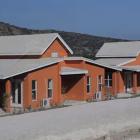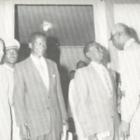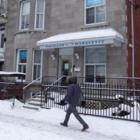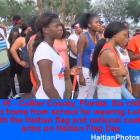ADVERTISEMENT
dominican
President Jocelerme Privert President Danilo Medina
Here is President Jocelerme Privert with Dominican President Danilo Medina.
During the last 7th ACS (Association of Caribbean States) Summit in Havana on June 4, 2016, when Danilo Medina, the Dominican president met President Jocelerme Privert, Medina greeted Privert with a direct question: "When will be elections in Haiti?" Privert replied very quickly, "According to all available information, it has been scheduled for October 9, 2016." Then Privert conveyed his warmest congratulations to the Dominican President Medina for his second time victory under banner of "Partido de la Liberación Dominicana" with 61.61% votes against his main rival Luis Abinader, of the "Partido Revolucionario Moderno" (PRM) party who obtained 35.22% of the votes. Election in Haiti is equally important to the Dominican Republic, because the two countries have many outstanding issues to settle. Privert, as an interim president representing an interim government with little political support, has very limited ability to solve these issues. He was appointed for a very short tenure (120 days) and not to remain in power. In October 2015 during Martelly regime, Haiti unilaterally banned import of 23 Dominican products which choked 88.72% of US$ 467.9 million annual trade between the two countries. As per the decision taken, the banned items cannot cross the land border, but they can enter by boat or plane on payment of taxes to the capital of Port-au-Prince or in the northern coastal town of Cap Haitien. The upcoming October 9 election will start from a scratch. There will be many new candidates, new agreements, new alliances, and different coalitions. Two former allies might become two opponents-- former Presidents Rene Preval and Jean-Bertrand Aristide. However, for us, one thing is important. Privert is thinking for the handover of power.
Andrés Navarro in New Jersey To Stop Haitian Resolution
Here is a picture of the foreign minister of the Dominican Republic, Andrés Navarro. He went to New Jersey in an attempt to dissuade a nonbinding resolution in the state Senate
On Thursday, August 6th, Andrés Navarro, the Foreign Minister of the Dominican Republic visited New Jersey to meet local politicians and dissuade them from passing a nonbinding resolution in the state Senate, which would criticize the Dominican Republic for stripping the citizenship of about 240,000 people who were born in the DR, but their parents were undocumented immigrants. A 2013 ruling of the Constitutional Tribunal of the Dominican Republic (Ruling No. 168-13) retroactively stripped citizenship from as many as 240,000 people born since 1929 to Haitian parents in the Dominican Republic. Following an international outcry, this resolution, sponsored by New Jersey State Senator Raymond Lesniak (D), respectfully urges the Dominican Republic to reinstate the citizenship of those of Haitian descent born in the Dominican Republic.
Tête-à-l'Eau, Banane, localité Bota,
Here is a picture of the localityTête-à-l'Eau, Banane in Bota, Haiti. It is an area targeted to provide housing for the Haitians arriving from the Dominican Republic.
This image was provided thanks to Mr. Maxo JOSEPH who went to Tête-à-l'Eau, Banane, localité Bota to see the progress as the Haitian Government promised to welcome more than tree thousand people.
Hundreds of thousands of undocumented immigrants in the D.R of whom most were Haitians or people of Haitian descent failed to register themselves within the Dominican deadline on June 17, 2015. Some human rights activists have called for an extension of this deadline. Many undocumented immigrants stood in the long lines outside the government offices for days, but were turned away repeatedly as they were told they lack necessary documents. Many of them could not come back as they could not convince their employers to give them time off of work to go register. As per the report of the Interior and Police minister Jose Ramon Fadul, so far 275,000 undocumented foreigners (about 50% of the total undocumented immigrants in the D.R) have been registered. The D.R authority is going to work with the remaining because they don't want to mistreat anyone, but want everyone to be regularized.
Deportation of Haitians in DR illegal, immoral and racist
Let's call a dog a dog. What the Dominicans are currently doing to Haitians and Dominican-Haitians is not the behavior of a civilized society. At least we can go along with the statement of New York City Mayor Bill de Blasio who described the behaviors of the Dominican government as illegal, immoral and racist.
The Dominican Republic (DR) is getting ready to expel thousands upon thousands of Haitian migrants and their natural-born progeny as the date for implementation of the new immigration law draws near. Human rights organizations claim the law is based on race-hatred of darker-skinned Haitians.
DR President Medina states no mass deportations will happen and 210,000-plus Haitians have registered for the regularization program. Meanwhile dozens of buses stand poised to transport deportees to Haiti's border.
NYC Mayor de Blasio denounces DR Haitian Migrant Deportation Plan
The Dominican Republic's (DR) plan to deport Dominican-born Haitians has drawn the ire of NYC Mayor de Blasio. He describes the DR's intentions as "illegal, immoral, and racist".
In Washington D.C. the Association of Haitian Professionals (AHP) are organizing a protest at the
Embassy of the Dominican Republic, where they will call for ending deportations. AHP says Dominicans target anyone, who possess "Haitian facial features" and commit violent acts on them.
NY Dominicans Protest Haitian Deportations in Dominican Republic
Here is a picture where several Dominicans in New York City are Protesting Haitian Deportations in Dominican Republic.
On Wednesday, June 17, 2015, the Dominicans living in New York came out in a move of solidarity and protest against a controversial Dominican court ruling supporting a debatable immigration policy which may render thousands of Dominican-Haitians stateless. The demonstrators assembled outside their Dominic consulate near the Time Square to show their stance against the anti-racism policy. A 2013 ruling has retroactively changed the nationality criteria for those born to immigrant parents in Haiti since 1929. The ruling was enacted in May 2014 and it allowed the susceptible Dominicans a time limit to establish their citizenship, which expired on June 17, 2015. One of the demonstrators, when asked, has described this move by the Dominican government as unprecedented because there is no other government in the world which could ever do this and it is more surprising because all the international bodies are mum on this. Some of the New York City's elected leaders and officials came out in support of these Dominican-Haitians. Mayor Bill de Blasio, in a statement, has called on the Dominican government to respect and guarantee basic rights to all.
Haitians trying to avoid deportation from Dominican Republic
Here is a long list of haitians in line applying just before the deadline to avoid deportation from Dominican Republic.
Dominican Expected To Begin Deporting Undocumented Immigrants
As the deadline for registering the adjustment of residential status has expired on June 17, 2015, the Dominican Republic is expected to begin deporting an estimated susceptible 500,000 undocumented immigrants of whom most are Haitians or Dominicans of Haitian descent. The D.R. government considers this a legitimate process to deal with the undocumented immigrants while ignoring the distinct characteristics of them. There are two distinct Haitian populations in the D.R-- Haitian immigrants engaged in low wage work and Dominicans of Haitian descent who were born in the country as citizen until a controversial court ruling unlawfully denationalized them in 2013. The majority of them do not speak Creole, know no one in Haiti, but would be uprooted from the place which they have known so far as their home in the Dominican Republic. Historically, many Dominican nationalists, by labeling its darker-skinned inhabitants as 'immigrants', have advocated to expel them from the country.
Haiti Reception centers for Returnees from Dominican Republic
If you think you have seen enough about Haitian behaviors, you have not. What you are looking at is what the Haitian government calls Haiti Reception centers for Returnees from Dominican Republic. Some how, the Haitian government expects to receive about 400,000 people in this area. This preparation has been ongoing for over one month now when the government said that this site is subject to welcome our compatriots.
Marie Yolène Gilles, the Programme Manager of the National Network Defenses of Human Rights (RNDDH) has revealed in a statement on June 18, 2015, that no structure has yet been built and nothing concrete step has been taken on the Haitian side of Dominican border other than a poster indicating the proposed site of the shelters on a vast desert. Although since the late May, the government had confidently continued its announcement about two welcome centers for the returnees, the GAAR (Groupe d'Appui aux Rapatriés & Réfugiés) had only traced two trucks, one tractor, two generators and two guards and a placard indicating : Welcome" on the 3 project sites located in Malpasse.
Undocumented Haitians Dominican Sugar cane Workers wait in long lines
Here is a picture of several undocumented Haitians Dominican Sugar cane Workers wait in long lines seeking to establish their legal residence.
The objective of the repatriation was aimed at regulating the continuous flow of migrants from impoverished Haiti to the relatively wealthier D.R. As per Interior Ministry's statement, there could be about 500,000 prospective applicants for residency under the program and of whom about 50,000 people would have a fair chance of granting citizenship. However, as of Wednesday, June 17, about 250,000 people have been registered and as per the officials, only about 10,000 have submitted sufficient required documents. In the final weeks, the number of applicants was far beyond, exceeding the serving capacity of the 36 processing centers under National Plan of Regularization of Foreigners (PNRE), and that made a disorganized process even worse. Many people have all the required documents but could not register due to lack of money, work schedule and overcrowded jumbled serving counters. There were few complaints that some police officers were providing preferential treatment in exchange for bribes.
Dominican Republic to deport undocumented Haitians
Here is a picture marking the end of the time allowed for Haitian migrants looking to establish their residence in the Dominican Republic before a midnight deadline.
In October 2013, the constitutional court of the Dominican Republic announced a decision that stripped an estimated 210,000 people -- about 2% of the country's population -- of their citizenship overnight, most of whom were Haitians and many Dominicans of Haitian descent. However, the government later softened its decision on mounting international pressure and allowed people with birth certificates to "validate" their citizenship, and those without them to register as foreign migrants, but however, with at least one parent must be a citizen or legal resident of D.R in each situation, within a deadline on June 17, 2015, 7:00 pm.

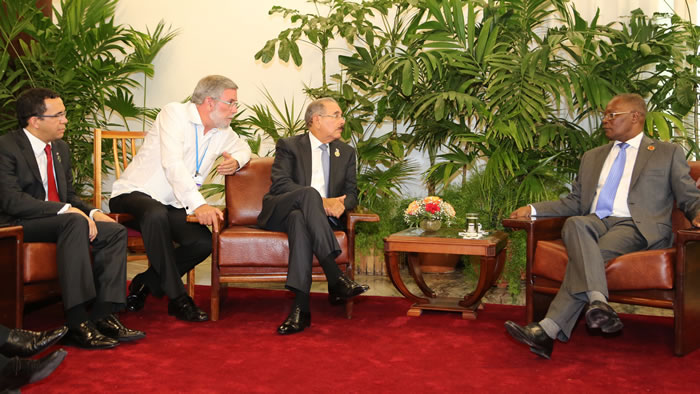
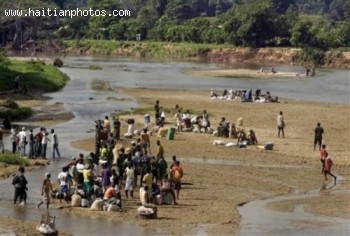
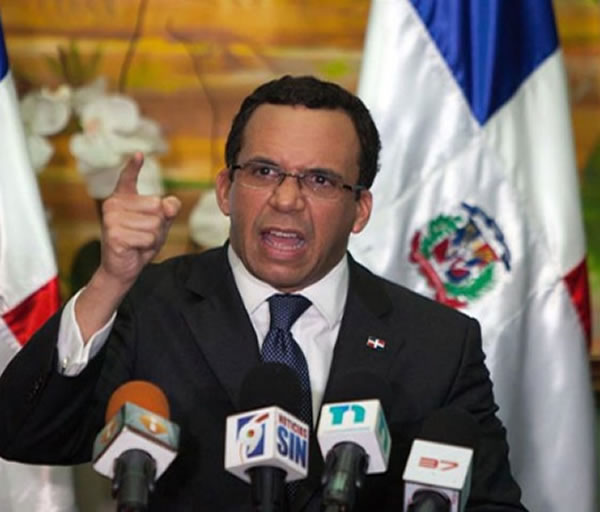
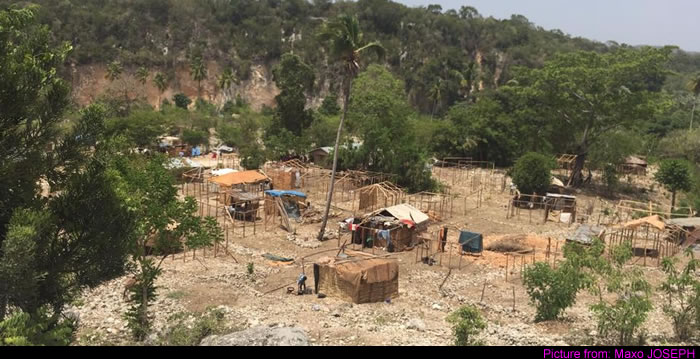
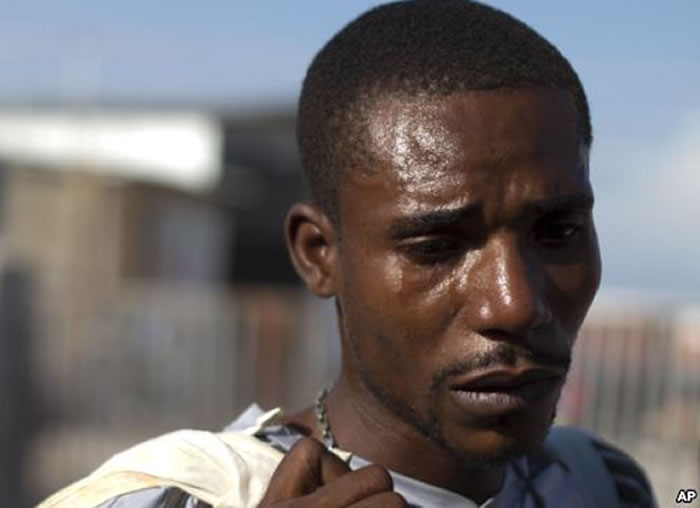
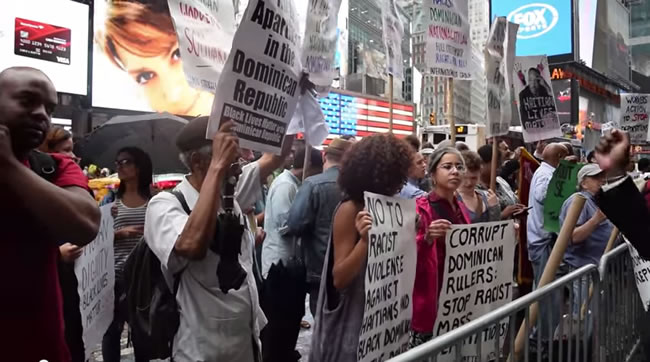
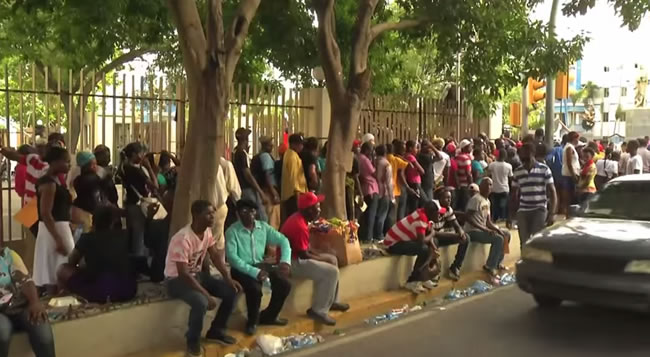
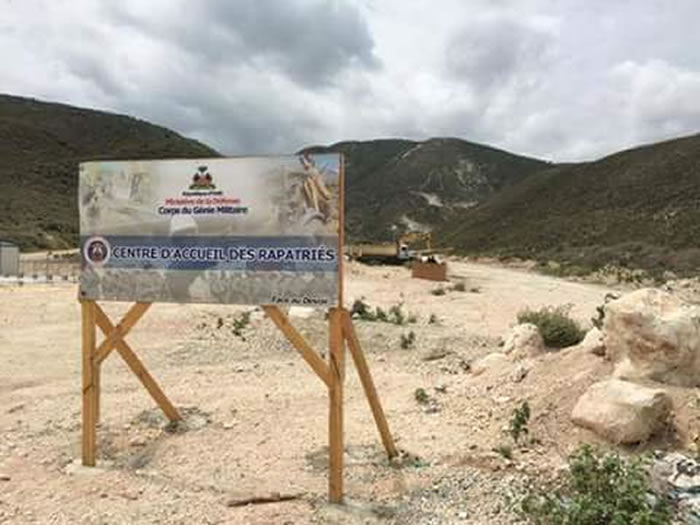
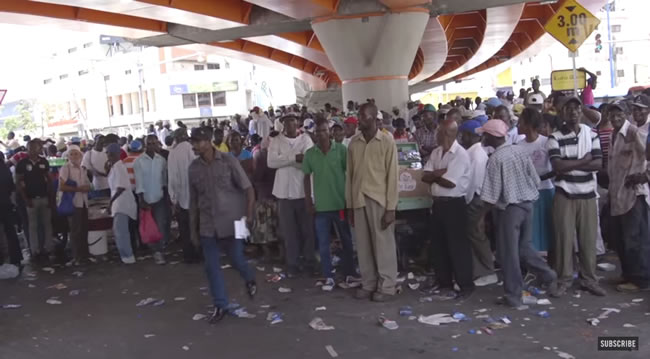
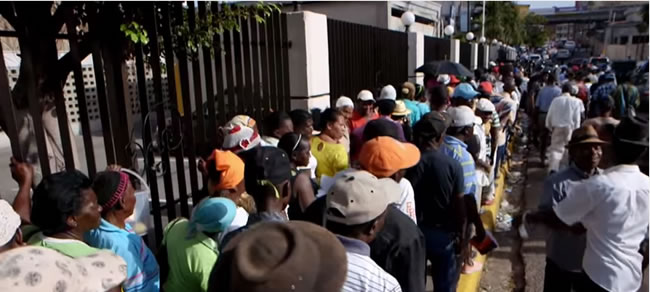
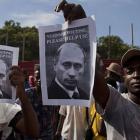 Haitian protesters called on Russian President Vladimir Putin...
Haitian protesters called on Russian President Vladimir Putin...  Children of Haitian descent handcuffed, deported from the Bahamas
Children of Haitian descent handcuffed, deported from the Bahamas  Should birthright citizenship be eliminated in the US?
Should birthright citizenship be eliminated in the US? 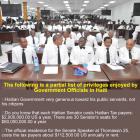 Partial list of privileges enjoyed by Government officials in...
Partial list of privileges enjoyed by Government officials in...  Philippe Vorbe entered world football Hall of Fame, CONCACAF
Philippe Vorbe entered world football Hall of Fame, CONCACAF  Dr. Henri Ford, First Haitian Dean At University of Miami Med...
Dr. Henri Ford, First Haitian Dean At University of Miami Med... 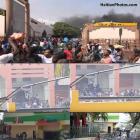 Delimart Plaza, Delmas 32, Port-au-Prince, Haiti being looted
Delimart Plaza, Delmas 32, Port-au-Prince, Haiti being looted 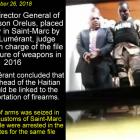 Former PNH Chief, Godson Orelus, arrested for illegal arm...
Former PNH Chief, Godson Orelus, arrested for illegal arm... 